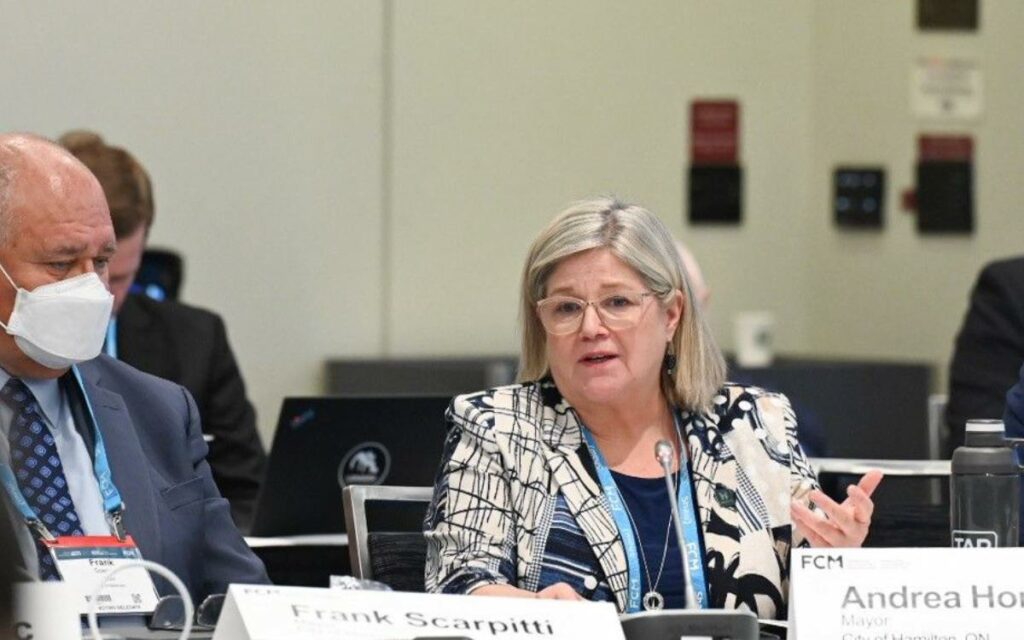
Mayor Andrea Horwath (pictured) does not reveal if she will use the new abilities. Photo credit: Twitter/Andrea Horwath
Last Friday, the Government of Ontario announced that Hamilton, as well as 25 other municipalities in the province, will receive strong mayor powers starting July 1, 2023.
Strong mayor powers were previously given to Toronto and Ottawa in fall 2022.
Other cities close to Hamilton that will also receive strong mayor powers are Brantford, Burlington, Niagara Falls, Oakville, and St. Catharines.
The province says that the 26 municipalities are all single or lower-tier municipalities with a population over 100,000 or growing to 100,000 by 2031 and that have submitted a “housing pledge” to the province.
The housing pledge is part of the Ontario government’s goal to build 1.5 million much-needed new homes by 2031.
The policy change was announced by Municipal Affairs and Housing Minister Steve Clark at a meeting of Ontario’s “Big City Mayors”.
The province says that the strong mayor powers will help municipalities to “cut red tape” and “speed up the delivery of key shared municipal-provincial priorities such as housing, transit and infrastructure in their municipalities.”
Following the announcement, The Hamilton Independent received a statement from Hamilton Mayor Andrea Horwath’s office.
The statement from Horwath was mum on whether or not she would use the powers.
The Hamilton mayor said, “I believe that working collaboratively yields the best results; finding common ground, developing partnerships, and coming to solutions that are broadly supported is the best way forward.”
She continued, “We have a number of issues facing the City of Hamilton and many exciting opportunities. I will continue to work hard every day with Hamilton and the residents of our great city as my priority.”
The comments were more held back than the ones she made at a 2022 mayoral debate, where Horwath said that the strong mayor powers were “not necessary” and even “dangerous.”
Waterdown-Flamborough-Carlisle Councillor Ted McMeekin, who previously served as a Liberal MPP for 18 years, told The Hamilton Independent that he has known Horwath for a long time and trusts that “she will continue to seek consensus from her Council.”
He contends that the strong mayor powers are “undemocratic” and “a move towards authoritarianism that will surely be rejected by our Mayor.”
Likewise, Downtown Councillor Cameron Kroetsch and West Mountain Councillor John-Paul Danko voiced their opposition to the powers via social media.
None of the more conservative-leaning Hamilton councillors responded to The Hamilton Independent or made any comments on the strong mayor powers on social media at the time of writing.
Various powers given to strong mayors include having the ability to appoint the municipality’s chief administrative officer, hiring certain municipal department heads, creating committees of council and appointing chairs and vice-chairs, proposing the municipal budget, vetoing certain by-laws and bringing forward specific matters for council consideration if it advances a provincial priority.
The by-law powers are specific to building new homes, the construction and maintenance of infrastructure, and supporting existing housing developments.
The province says that there are also the proper checks and balances in place to oversee those mayors who will get the new powers. For example, councils can override a mayor’s veto of by-laws or budget amendments with a two-thirds majority vote.
Additionally, there are other limits to the powers. For example, strong mayors cannot appoint police chiefs or medical officers of health.
Outside of Hamilton, a number of high-profile Ontario mayors voiced their support of the extension of powers.
Marianne Meed Ward, Chair of the Ontario Big City Mayors and Mayor of Burlington said, “Different communities require different tools and approaches to address local housing needs, and strong mayor powers are one such tool that can help mayors and municipalities meet their housing targets.”
Mayor of Guelph Cam Guthrie and Mayor of Brampton Patrick Brown were also supportive.
Brown said that “Premier Ford has extensive experience at the municipal level and has seen firsthand how the municipal powers for the mayor were inconsistent with implementing the agenda they were elected on.”
“I am grateful the premier has made it easier to implement our respective agendas,” he continued.

Based in Hamilton, he reaches hundreds of thousands of people monthly on Facebook, Instagram, TikTok, and Twitter. He has been published in The Hamilton Spectator, Stoney Creek News, and Bay Observer. He has also been a segment host with Cable 14 Hamilton. In 2017, he received the Chancellor Full Tuition Scholarship from the University of Ottawa (BA, 2022). He has also received the Governor General’s Academic Medal. He formerly worked in a non-partisan role on Parliament Hill in Ottawa.






